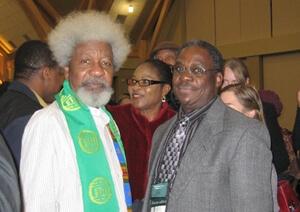"You won't believe it," says Amaka Azuike, novelist, poet and senior lecturer of literature in English at the University of Jos in Nigeria. "There are people who actually go to the extent of selling things — cars, property — just to make it here." She's referring to the African Literature Association (ALA) conference, whose 35th annual meeting convened at UVM last week. The conference is held on the continent every five years, which allows for greater African participation, but universities there often lack the resources to send scholars abroad. And still, when they can, they come.
"You meet different people, from different cultures," explains Azuike, "you share ideas, beliefs. You mingle with great writers, you make friends, you make enemies if you like." She takes photographs and buys books to share with her students at home.
Lokangaka Losambe (pictured above on the right with Nobel Laureate Wole Soyinka on left), professor and chair of English and the organizer of this year's conference, understands. This year's theme was "Africa and Blackness in World Literature and Visual Arts," but ideas about globalization were a strong undercurrent linking the past three gatherings. Absent global exchange, the wide-ranging influences on African and African Diaspora literature would be lost to a world hungry for both shared experiences and understanding of the diversity among peoples with different social and political pasts.
"African literature," says Losambe, "like any other literature, evolves. New works come out, they introduce new paradigms, new perspectives as the world order moves. "
The ALA provides a forum for exploring works new and old; this year's conference brought 400 participants from more than 55 countries to campus. Africa, Losambe notes, had a vibrant literary tradition — an oral one — long before colonialism took root. Independence, dictatorship, military rule all became fertile territory for creative and political expression. And yet, as many Africans have moved into American universities, their writings on the same topic invariably change.
"The way they articulate it," Losambe says, "will be different from the person living in the country. We want to have a dialogue all the time about that. But," he adds, "there is also the critical debate about the nature of the art of African literature in conjunction with the totality of universal literature. Most of that debate happens here."
Worlds in translation
Among the untold tasks Losambe has undertaken since UVM won its bid to host this prestigious conference two years ago, was bringing in notable speakers, the people who stir young African scholars like Azuike to sacrifice for the privilege of hearing them. Praise for Losambe's vision and organization has been pouring into his inbox since Sunday, but signing playwright Wole Soyinka to present the keynote address was clearly a highlight. Soyinka, author of the acclaimed Death and the King's Horseman, was the first African to win the Nobel Prize for Literature.
In his speech, "The Creative Pursuit in Global Times," Soyinka played with the notion in his title of "time" as "tempo" and even took a shot at globalization, calling it, at least in terms of corporate interests, another form of colonialism, domination over the local and unique.
But sharing his intellectual expertise across cultures is what Soyinka does. The writer, who was once forced into exile by military dictatorship, now divides his time between his homeland of Nigeria and posts at U.S. universities. During the conference he sat with UVM students, answering their questions: Shakespearian tragedy versus African tragedy, tradition versus modernity in his work.
Asked whether he writes in Yoruba or English, he answers that the early work he wrote in Yoruba, which was then an easy job for translation into English. Now, he says, he writes in English, but — a major challenge according to his translator — he, thinks in Yoruba.
In writing, Soyinka tells the students, "an image comes to us fully formed, then sensation comes; you hope you're not a lunatic and others have had that kind of sensation and can relate."
Even a glimmer of self-doubt from a character of this stature must come as a relief to the young writers in the room. If Losambe had any similar feelings about building this conference, they've been dispelled, with a call even for his succeeding the outgoing president of the ALA. As one Ghanaian attendee wrote, "Ayekoo," congratulations, well done.
